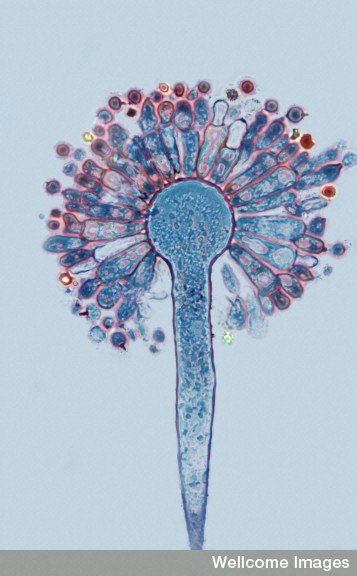 A micrograph of an Aspergillus spore, a type of fungus that produces cancer-causing aflatoxin.
A micrograph of an Aspergillus spore, a type of fungus that produces cancer-causing aflatoxin.What are aflatoxins?
Aflatoxins are a family of toxins produced by certain fungi that are found on agricultural crops such as maize (corn), peanuts, cottonseed, and tree nuts. The main fungi that produce aflatoxins are Aspergillus flavus and Aspergillus parasiticus, which are abundant in warm and humid regions of the world. Aflatoxin-producing fungi can contaminate crops in the field, at harvest, and during storage.
How are people exposed to aflatoxins?
People can be exposed to aflatoxins by eating contaminated plant products (such as peanuts) or by consuming meat or dairy products from animals that ate contaminated feed. Farmers and other agricultural workers may be exposed by inhaling dust generated during the handling and processing of contaminated crops and feeds.
Which cancers are associated with exposure to aflatoxins?
Exposure to aflatoxins is associated with an increased risk of liver cancer.
How can aflatoxin exposure be reduced?
You can reduce your aflatoxin exposure by buying only major commercial brands of nuts and nut butters and by discarding nuts that look moldy, discolored, or shriveled. To help minimize risk, the U.S. Food and Drug Administration (FDA) tests foods that may contain aflatoxins, such as peanuts and peanut butter. To date, no outbreak of human illness caused by aflatoxins has been reported in the United States, but such outbreaks have occurred in some developing countries.




